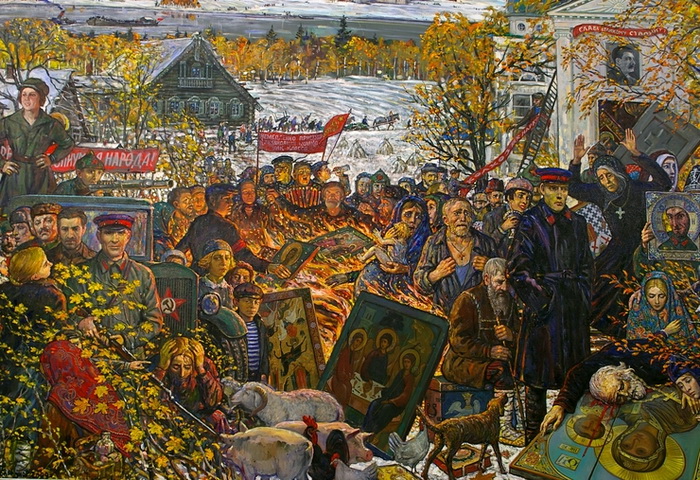For much of the West in the middle of the
19th century, the idea of Russia and how to approach its people
diplomatically was a matter of differentiating them as Europeans or
Asians. The prevailing view at the time was a belief that Russians
belonged to the latter group, and could not be considered part of
Europe. The absolute role of the Russian Monarchy was an increasingly
alien concept to the people of the West, a generation that was no
stranger to popular upheavals and calls for political reform. Marx
created the concepts of the “asiatic mode of production” and “oriental
despotism” with reference to the Russian Empire, believing that their
path to communistic development was different than the industrialized
nations of the Atlantic. Still, the intellectual body of these same
nations was divided, some believing that the people of Russia were
indeed Europeans, but comparatively primitive to the rest of the
continent and lacking in the necessary Enlightenment values of modern
statehood. Through one form or another, this way of thought has survived
to our time, and its continued existence gives credence to the vast
differences between the Western and Russian cultures. Indeed, history
repeats itself.
The earliest Western understandings of
Russia come from second-hand accounts of German historians. The relative
distance and lack of interaction with the heart of Europe meant that
any view of Russia would be inevitably flawed, and it is this continued
misunderstanding of our culture that drives modern relations with
Russia. Almost formulaically, we see in all of the last three periods of
Russian history an interest by foreigners to change or redefine Russia
as well as an engagement of those foreigners by activists that were
exiled by the Russian government or who found no support for their ideas
back home.
For the American people, the
first widely-read exposition of how the Russian people lived was from
the explorer George Kennan, who took on work from the Russian-American
Company to help lay telegraph cables in the Far East to reach Alaska.
Shortly after, his interest in Russia led him to return as a
correspondent for the Associated Press, at which time he observed the
outer reaches of Russian society, from its labor camps to its rural
villages. After befriending several political radicals in exile, ranging
from Siberian separatists to Anarchists, Kennan devoted himself to the
cause of revolution in Russia, going on to lecture and write about the
political state of the Russian Empire upon his return to America. Even
as a man of a relatively different time, Kennan’s rhetoric echoes
similar misunderstandings and personal interests found in modern critics
of Russia.
For one, Kennan’s understanding of the
Russian Empire outside of his travels was skewed as he was almost
exclusively informed by political activists on the fringe of Russian
society (literally and figuratively). He believed that Russians suffered
under autocratic rule and the authority of a superstitious church, both
things that offended his democratic and pluralistic sentiment. Around
the same time in the cultural centers of Russia, in the midst of a renewed interest in Occidentalism, the
imperial administration of Nicholas I put forth the idea of “Orthodoxy,
Autocracy, and Nationality”, which necessitated a loyalty to the
Russian faith, government, and people. To the chagrin of Western
observers, this move was supported by a broad number of public
intellectuals at the time, including the writer Nikolai Gogol. As a
result of this, a rejection of European rationalism followed, and gave
way for an emphasis on mysticism and Slavophilia, and a belief of
Russian civilization as an entity fundamentally different from Europe.
One of the most prominent philosophical circles of Russian conservative
thought, the Society of the Widsom-lovers, was created around this time,
of which Ivan Kireyevsky was a member. To my knowledge, these
developments were not noted in Kennan’s writings at all. Whether
willfully or unknowingly, modern critics of the Russian government also
ignore the large amount of popular conservative philosophy that
influences Kremlin policy today.
Rather unfairly, these philosophers
remain untranslated in the West despite their great contributions to
Russian thought. Instead, it was the socialists and anarchists who fled
Russia to live in London, Paris, and America that defined Russian
philosophy to an audience much more hospitable to their ideas. Figures
such as Herzen, Bakunin, and Kropotkin used resources in their adopted
homelands to print political material to send back to Russia while Lenin
and Trotsky ingratiated themselves with potential financiers and
ideologues of revolution. In 1874, the socialist revolutionary Nikolai
Chaikovsky avoided opposition from former classmates and authority in
Russia by leaving the country to start a commune in Kansas. In 1906, he
invited the writer Maxim Gorky to come to New York and give a
lecture on the need to bring democracy to Russia through revolution, an
event organized by the Society of Friends of Russian Freedom, with Mark
Twain among the prominent Americans selected to be on the society’s head
committee.
Read the rest of this article at - http://souloftheeast.org/2015/04/02/whos-trying-to-change-russia/
